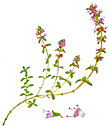
Thyme is a plant and an herb.
- botanical information
- origin
- history
- nutritional information
- astrological correspondences
- magick correspondences and uses
botanical information:
Botanical name: Thymus vulgaris
Common name: thyme
Use the botanical name when ordering seeds (bulbs, etc.) or when looking up information in the library. Common names vary by nation, culture, and region, and sometimes the same common name is applied to different plants.
origin:
Origin: Mediterranean
history:
History: Thyme was one of the ingredients mentioned in the Eber’s Papyrus. The Eber’s Papyrus (from between 1600 B.C.E. and 1550 B.C.E.), was discovered by German Egyptologist Georg Ebers in 1874 C.E. The Eber’s Papyrus is the oldest known complete medical textbook in existence. Most scholars believe that it is copy of a much earlier text, probably from around 3100 B.C.E. The Eber’s Papyrus includes information on surgery and internal medicine, including a list of more than 800 drugs.
Thyme was listed among many aromatic plants in a scroll of cuneiform from the great library at Nineveh. The library at Nineveh was established by King Ashurbanipal of Assyria (668-633 B.C.E.).
nutritional information:
“Oh, my fellow men, do not defile your bodies with sinful foods. We have corn, we have apples bending down the branches with their weight, and grapes swelling on the vines. There are sweet-flavored herbs, and vegetables which can be cooked and softened over the fire, nor are you denied milk or thyme-scented honey. The earth affords a lavish supply of riches, of innocent foods, and offers you banquets that involve no bloodshed or slaughter; only beasts satisfy their hunger with flesh, and not even all of those, because horses, cattle, and sheep live on grass.”, Pythagoras (Greek mathematician).
astrological correspondences:
Astrological planet: Mercury and Venus ![]()
![]()
magickal correspondences and uses:
Incense: Thyme incense or herb is appropriate for burning in love spells, such as the Aphrodite New Moon love spell, Hecate black candle love spell, or Isis Full Moon love spell.
Mercury spells: Thyme (as an herb) may be used in as an ingredient or substitute for magick spells and formulas related to Mercury matters (overcoming addiction, breaking bad habits, communication, divination, eloquence, intelligence, mental powers, psychic powers, self-improvement, study, travel, and wisdom). Be careful about substitutions for preparations that will be ingested or come in contact with the skin. These substitutions do not apply to medical uses. See the article on Mercury for a list of herbal substitutes for thyme.
Venus spells: Thyme (as an herb) may be used in as an ingredient or substitute for magick spells and formulas related to Venus matters (beauty, compassion, fidelity, friendship, happiness, interchanges, joy, love, luck, meditation, pleasure, reconciliation, and youth). Be careful about substitutions for preparations that will be ingested or come in contact with the skin. These substitutions do not apply to medical uses. See the article on Venus for a list of herbal substitutes for thyme.
Love spells: Thyme flowers are appropriate for use in love spells, such as the Aphrodite New Moon love spell.
Magick food for love spells: Thyme is an appropriate ingredient for use in food for love spells, such as the Aphrodite New Moon love spell, Hecate black candle love spell, or Isis Full Moon love spell. See the article on foods for more information on using food magick in spells.
Magickal substitutions: Rosemary usually may be safely substituted for any herb in magick spells and rituals. Roses may safely be substituted for any flower.
health care uses:
Health Notice: Attempting to be an amateur doctor is potentially dangerous to your health. This web page is not professional medical advice. Nothing on this website should be considered as a substitute or replacement for professional medical advice. Persons should seek the advice of qualified health providers. Self-medication should not be used as a substitute for professional medical care. Please confirm all self-medication with your doctor or health care professional. See the article on healing for recommended healers.
traditional medicine:
Traditional Medicine: While many traditional practices have been scientifically verified, some are now known to be dangerous. Seek the advice of qualified health care providers.
Traditional medicinal uses: Thyme was one of the ingredients mentioned in the Eber’s Papyrus. The Eber’s Papyrus is the oldest known complete medical textbook in existence. Most scholars believe that it is copy of a much earlier text, probably from around 3100 B.C.E. Thyme was listed among many aromatic plants in a scroll of cuneiform from the great library at Nineveh. The library at Nineveh was established by King Ashurbanipal of Assyria (668-633 B.C.E.).Note that not all traditional medications are effective or even safe.
Thyme was traditionally used to treat coughs and colds.
herbal healing:
In modern times, thyme is used for sore throat and diarrhea.
Thyme is used to stimulate the appetite.
Thyme is used to help soothe stomach and intestinal ailments.
Some herbs may be poisonious under some conditions. Exercise appropriate care.
Wild gathering: Avoid wild gathering. Some plants are endangered species. Some plants can be toxic just by touch. Even experts can make deadly misidentifications of wild plants. Please grow your own herbs in your own goddess garden (or window boxes).


See also: herbs.














